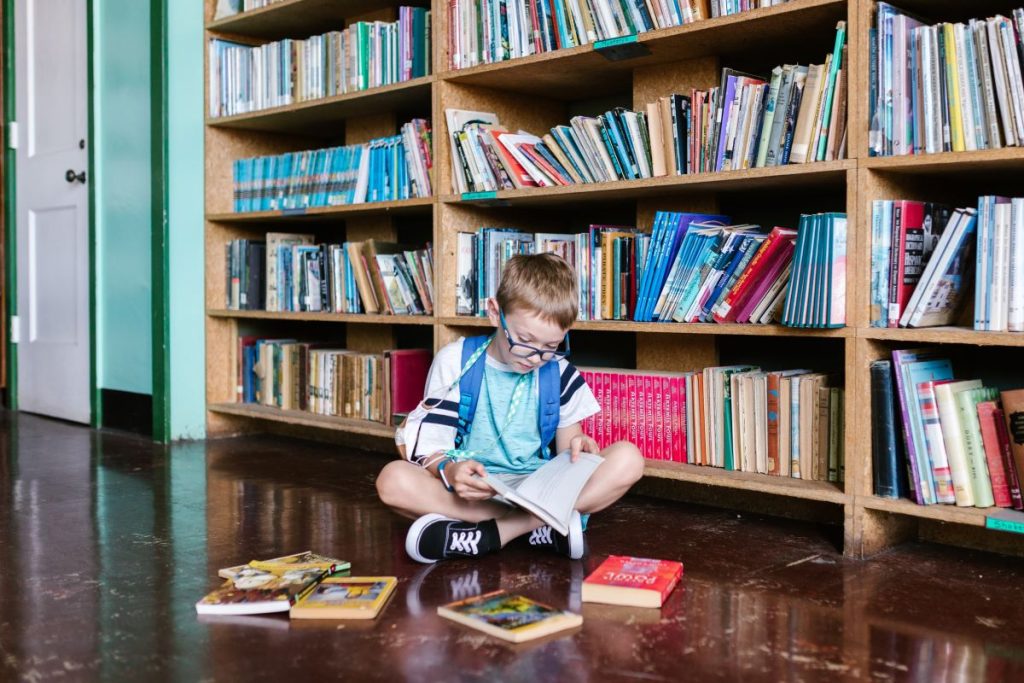5 poezii în engleză despre școală. Versuri amuzante pentru școlari

Haz de necaz – uneori e mai bine să facem acest lucru, decât să le ținem predici celor mici legat de cât de minunată, de utilă este școala și cât de bine se vor simți acolo. Un zâmbet, un pic de râs vindecă teama și stresul, spulberă mai ușor împotrivirea decât simpla morală. Așa că am făcut o selecție a celor mai amuzante și mai dulci poezii despre școală scrise în limba engleză și accesibile copiilor de școală primară sau de gimnaziu care urmează cursuri de engleză și pot înțelege texte de nivel elementar sau pre-intermediar. Citește să vezi unde se va regăsi copilul tău!
Sick – Shel Silverstein
Poezia copilașului ipohondru, sau a copilașului care își știe părinții puțin ipohondri și profită uneori, invocând diferite afecțiuni pentru a fi scutit de a merge la școală. Micuța Peggy Ann McKay are un întreg arsenal de boli la îndemână pe care le pune, pe toate, în joc. Merită cu prisosință să și asculți această poezie despre școală în engleză în lectura foarte unei fetițe de cinci ani – încearcă aici.
„I cannot go to school today,”
Said little Peggy Ann McKay.
„I have the measles and the mumps,
A gash, a rash and purple bumps.
My mouth is wet, my throat is dry,
I’m going blind in my right eye.
My tonsils are as big as rocks,
I’ve counted sixteen chicken pox
And there’s one more—that’s seventeen,
And don’t you think my face looks green?
My leg is cut—my eyes are blue—
It might be instamatic flu.
I cough and sneeze and gasp and choke,
I’m sure that my left leg is broke—
My hip hurts when I move my chin,
My belly button’s caving in,
My back is wrenched, my ankle’s sprained,
My ‘pendix pains each time it rains.
My nose is cold, my toes are numb.
I have a sliver in my thumb.
My neck is stiff, my voice is weak,
I hardly whisper when I speak.
My tongue is filling up my mouth,
I think my hair is falling out.
My elbow’s bent, my spine ain’t straight,
My temperature is one-o-eight.
My brain is shrunk, I cannot hear,
There is a hole inside my ear.
I have a hangnail, and my heart is—what?
What’s that? What’s that you say?
You say today is. . .Saturday?
G’bye, I’m going out to play!”

Temele date de profesorii de la școală le dau veritable coșmaruri unora dintre copii.
Homework! oh, Homework! – Jack Prelutsky
Poezia copilului care se vaită, se îngrozește, se agită, se stresează, transpiră numai când se gândește la efectuarea temelor. Care detestă așa de tare temele, încât pregătirea pentru ele durează mai mult decât rezolvarea în sine. Și care din cauza temelor, se teme de școală…
Homework! Oh, Homework!
I hate you! You stink!
I wish I could wash you away in the sink,
if only a bomb
would explode you to bits.
Homework! Oh, homework!
You’re giving me fits.
I’d rather take baths
with a man-eating shark,
or wrestle a lion
alone in the dark,
eat spinach and liver,
pet ten porcupines,
than tackle the homework,
my teacher assigns.
Homework! Oh, homework!
you’re last on my list,
I simple can’t see
why you even exist,
if you just disappeared
it would tickle me pink.
Homework! Oh, homework!
I hate you! You stink!
Round and Round – John Kitching
Această poezie în limba engleză descrie copiii sociabili, inocenți care se bucură de compania prietenilor lor, savurează pauzele, jocurile de la școală și care se simt ca peștele în apă în acest mediu.
Round and round the playground,
Marching in a line,
I’ll hold your hand.
You hold mine.
Round and round the playground
Skipping in a ring
Everybody loves it
When we all sing.
Round and round the playground
That’s what we like:
Climbing on the climbing frame,
Riding on the bike.
Round and round the playground,
All together, friends.
We’re sad, sad, sad
When the school day ends.
Where do all the teachers go? – Peter Dixon
De multe ori, copiii își imaginează că profesorii se nasc și locuiesc la școală, că îi preocupă doar școala și performanțele elevilor și că viața lor este oricum, numai normală nu. Oare ce face un profesor în timpul său liber? Poezia în engleză a lui Peter Dixon tratează cu umor ipotezele dezvoltate de mintea copiilor de școală primară cu privire la profesori.
Where do all the teachers go
When it’s four o’clock?
Do they live in houses?
And do they wash their socks?
Do they wear pajamas?
And do they watch TV?
And do they pick their noses?
The same as you and me?
Do they live with other people?
Have they mum and dads?
And were they ever children?
And were they ever bad?
Did they ever, never spell right?
Did they ever make mistakes?
Were they punished in the corner?
If they stole the chocolate flakes?
Did they ever lose their hymn books?
Did they ever leave their greens?
Did they scribble on the desktops?
Did they wear old dirty jeans?
I’ll follow one back home today.
I’ll find out what they do.
Then I’ll put it in a poem.
That they can read to you.

Biblioteca ar trebui să reprezinte sufletul și inima unei școli.
The Library – Barbara A. Huff
O candidă poezie în engleză închinată unei instituții care înglobează mii de lumi diferite: biblioteca. Parte din viața școlară, biblioteca ar trebui să reprezinte sufletul și inima clădirii – dacă ai un copil pasionat de citit, cu siguranță versurile vor fi pe gustul său!
It looks like any building
When you pass it on the street,
Made of stone and glass and marble,
Made of iron and concrete.
But once inside you can ride
A camel or a train,
Visit Rome, Siam, or Nome,
Feel a hurricane,
Meet a king, learn to sing,
How to bake a pie,
Go to sea, plant a tree,
Find how airplanes fly,
Train a horse, and of course
Have all the dogs you’d like,
See the moon, a sandy dune,
Or catch a whopping pike.
Everything that books can bring
You’ll find inside those walls.
A world is there for you to share
When adventure calls.
You cannot tell its magic
By the way the building looks,
But there’s wonderment within it,
The wonderment of books.
E important să discuți cu cel mic atât părțile bune, cât și cele potențial amuzante sau mai delicate legate de școală, astfel încât să aibă sentimentul de familiar atunci când pășește din nou în clasă după o vacanță mai lungă. Textele, poveștile, cărțile și poeziile, atât în română cât și în engleză, pe această temă sunt de mare ajutor și ele pentru ca elevii să fie bine pregătiți psihic și să se poată concentra, ulterior, pe învățare.
Sursa foto: Pexels
- Cuvinte care se scriu cu majuscule în limba engleză - 11 aprilie 2025
- Sărbătoarea Paștelui în limba engleză. Cuvinte folosite, urări și obiceiuri din Marea Britanie - 8 aprilie 2025
- Echivalarea examenului de Bac la limba engleză. Tot ce trebuie să știi - 8 aprilie 2025








